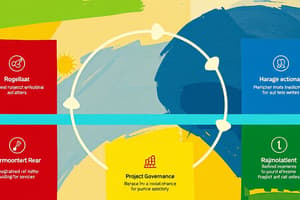Podcast
Questions and Answers
Which of the following is NOT a key element of a well-structured business case?
Which of the following is NOT a key element of a well-structured business case?
- Analysis of potential alternatives
- Selection of team members (correct)
- Description of the project's objectives
- Evaluation of costs and benefits
Utilizing sustainable materials has no impact on environmental footprints.
Utilizing sustainable materials has no impact on environmental footprints.
False (B)
What is the primary purpose of a business case?
What is the primary purpose of a business case?
To articulate the justification for undertaking a specific project.
Measuring and reporting on sustainability performance is essential for ______ and continuous improvement.
Measuring and reporting on sustainability performance is essential for ______ and continuous improvement.
Match the following components with their roles in a business case:
Match the following components with their roles in a business case:
Which of the following phases is NOT typically included in the project life cycle?
Which of the following phases is NOT typically included in the project life cycle?
Governance arrangements are solely concerned with financial management in projects.
Governance arrangements are solely concerned with financial management in projects.
What is a key element of effective project governance?
What is a key element of effective project governance?
A successful project life cycle involves effective planning, resource management, risk assessment, and __________.
A successful project life cycle involves effective planning, resource management, risk assessment, and __________.
Match the following project management aspects with their descriptions:
Match the following project management aspects with their descriptions:
Which project methodology is characterized by iterative phases?
Which project methodology is characterized by iterative phases?
Incorporating sustainability considerations in project management has no impact on economic viability.
Incorporating sustainability considerations in project management has no impact on economic viability.
What is one benefit of effective project governance?
What is one benefit of effective project governance?
Flashcards
Project Life Cycle
Project Life Cycle
The structured path a project follows from its beginning to its completion, composed of distinct phases.
Project Initiation
Project Initiation
The initial phase of a project, where the project's goals, scope, and feasibility are defined.
Project Planning
Project Planning
Involves detailed planning, resource allocation, risk assessment, and communication strategies for the project.
Project Execution
Project Execution
Signup and view all the flashcards
Project Monitoring and Controlling
Project Monitoring and Controlling
Signup and view all the flashcards
Business Case
Business Case
Signup and view all the flashcards
Project Closure
Project Closure
Signup and view all the flashcards
Project Scope
Project Scope
Signup and view all the flashcards
Project Management Governance
Project Management Governance
Signup and view all the flashcards
Alternative Analysis
Alternative Analysis
Signup and view all the flashcards
Cost-Benefit Analysis
Cost-Benefit Analysis
Signup and view all the flashcards
Sustainable Project Management
Sustainable Project Management
Signup and view all the flashcards
Organizational Alignment
Organizational Alignment
Signup and view all the flashcards
Study Notes
Project Management Life Cycles
- Project life cycles progress through phases, starting with initiation and concluding with closure.
- Common phases include initiation, planning, execution, monitoring and controlling, and closure.
- Each phase has specific goals and deliverables.
- Project methodologies, such as Agile, Waterfall, and Hybrid, impact phase specifics.
- Iterative approaches repeat or refine phases throughout the project.
- Successful projects necessitate effective planning, resource management, risk assessment, and communication.
- Key performance indicators (KPIs) track progress against project targets.
- Clear communication fosters stakeholder collaboration and alignment.
Project Management Governance Arrangements
- Governance structures define roles, responsibilities, and decision-making processes.
- Effective governance aligns projects with organizational and stakeholder objectives.
- Governance involves defining:
- Stakeholder roles and responsibilities (project manager, team, senior management).
- Clear communication channels and decision-making protocols.
- A project charter outlining scope, objectives, and acceptance criteria.
- Risk management, issue resolution, and change control processes.
- Mechanisms for regulatory and standard compliance.
- Effective governance frameworks ensure accountability and transparency.
- Transparency and accountability build stakeholder trust and enhance project success.
Sustainability in Project Management
- Integrating sustainability into project planning and execution is vital for long-term value.
- Sustainable projects aim for minimal environmental impact, social responsibility, and economic viability.
- This includes:
- Environmental impact assessments and mitigation strategies.
- Implementing environmentally sound technologies and processes.
- Considering social equity and inclusion in project design and delivery.
- Promoting ethical practices and corporate social responsibility (CSR).
- Optimizing resource use and minimizing waste.
- Using sustainable materials and practices reduces environmental impact.
- Tracking and reporting on sustainability performance ensures accountability and continuous improvement.
- Projects focusing on renewable energy or waste reduction exemplify sustainable principles.
Business Case for Projects
- A business case justifies a project's undertaking.
- A strong business case connects the project to organizational strategic goals.
- A well-structured business case includes:
- Project objectives and scope description.
- Problem or opportunity addressed.
- Analysis of alternative solutions.
- Cost, benefit, and risk evaluation of alternatives.
- Financial projections and return on investment (ROI) calculations.
- Justification for project necessity and value creation.
- A compelling business case secures stakeholder support and approval.
- Key factors in a business case include economic viability, cost-benefit analysis, and alignment with organizational strategy.
- Justifying resource allocation is crucial for stakeholder buy-in.
Studying That Suits You
Use AI to generate personalized quizzes and flashcards to suit your learning preferences.




